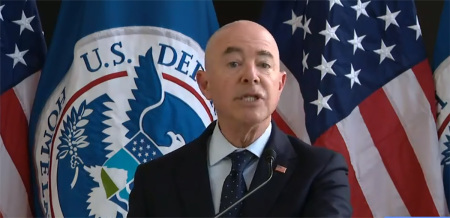Biden’s DHS warns Cubans against attempting to flee to the US: ‘Do not risk your life’

The Biden administration said it won't allow Cuban refugees to enter the United States by maritime migration, as protests against the communist regime in Cuba continue to unfold.
Secretary of Homeland Security Alejandro Mayorkas gave a press briefing on Tuesday about the current state of the U.S. Maritime Migrant Interdiction Operations.
Mayorkas, a native of Cuba who was the first Latino to serve as secretary of the Department of Homeland Security, said in his remarks that the administration supports the Cuban protesters, but such an attempt to enter the U.S. was "unsafe and illegal."
“We also stand in solidarity with the Cuban people and their call for freedom from the repression and economic suffering that the Cuban’s authoritarian regime is causing,” he said.
From there, Mayorkas said that Cubans using “unpermitted vessel departures from Florida to Cuba” would also not be permitted to enter the U.S.
“The time is never right to attempt migration by sea. To those who risk their lives doing so, this risk is not worth taking,” he continued. “Allow me to be clear: if you take to the sea, you will not come to the United States.”
“If individuals make, establish a well-founded fear of persecution or torture, they are referred to third countries for resettlement,” Mayorkas said, reiterating that they will be denied entry into the U.S.
Again, I repeat: Do not risk your life attempting to enter the United States illegally."
Mayorkas said the reasons for the Biden administration's ban on entering the U.S. by sea centered on safety concerns, such as dangerous weather.
“The waters in the Straits of Florida in the Caribbean are dangerous, especially now as we have entered hurricane season. People will die,” noted the Homeland Security secretary.
“The transit is dangerous and unforgiving. We have seen 20 lives lost in recent weeks, as a result of these dangerous voyages. In addition, the threat of serious illness when boarding vessels in subpar conditions is greater at this time, during a pandemic.”
Recently, protests have broken out in Cuba, inflamed by problems such as an economic downturn and ongoing shortages of necessities like medical supplies and food.
Cuban President Díaz-Canel reportedly told the communist country on national television that the protesters should be confronted, and blamed U.S. sanctions for their economic woes.
The protests have been met with repression by government authorities, including police firing on demonstrators, large-scale arrests, and blackouts on internet access.
Sen. Marco Rubio, R-Fla., a Cuban-American and strong supporter of the protesters, has criticized the Biden administration’s response to the Cuban protests.
“Here’s the bottom line,” said Rubio in an interview on Fox News. “This administration’s response has been lame. It has been lame on this whole issue.”
“I wish they had half the passion that they have for going after Republican state legislatures, and Republican governors, and Republican members of Congress. I wish they had half the passion that they have against Republicans that they do against the tyranny of Cuba.”
Erika Guevara-Rosas, Americas director at Amnesty International, released a statement Monday denouncing the measures taken by the communist government against the demonstrators.
“Instead of repressing the population, the Cuban authorities have an obligation to protect their right to demonstrate peacefully,” stated Guevara-Rosas.
“The Díaz-Canel government must address the social demands of its citizens, given the economic crisis, the shortages of food and medicine, the collapse of the health system — which is not responding to the current COVID-19 crisis — and the accumulation of historical demands for respect of the rights to freedom of expression and peaceful assembly.”
The U.S. hasn't seen a rise in the number of Cubans attempting to reach the U.S. by sea, despite the concerns raised by Mayoras which he said also applied to Haitians.
Although the U.S. designated Haiti for Temporary Protected Status in May for 18 months, it only applies to Haitians who are already in the country.





















